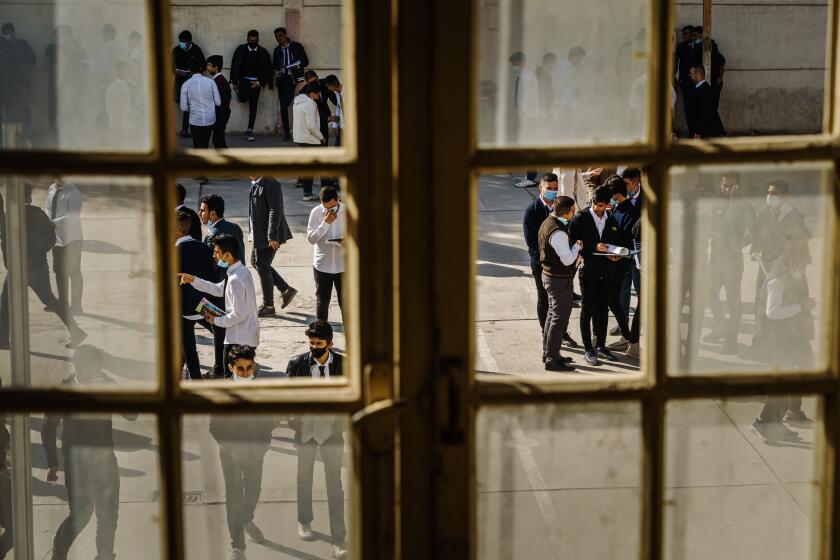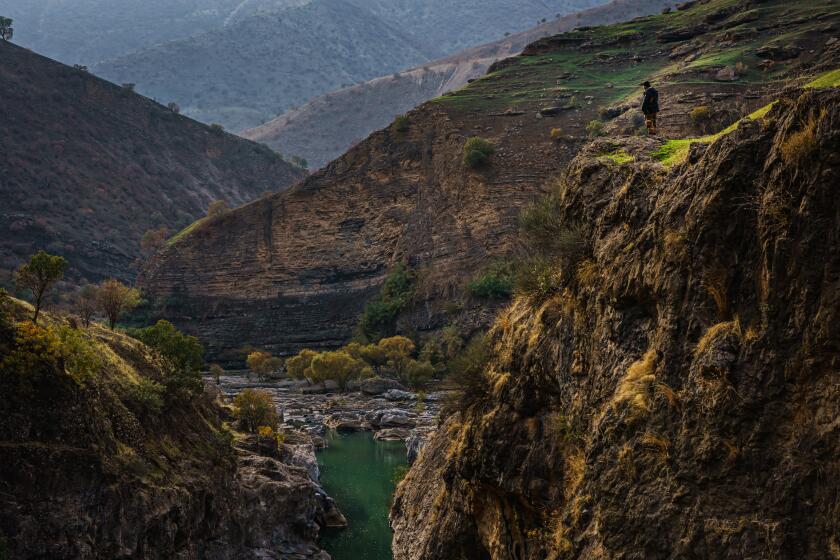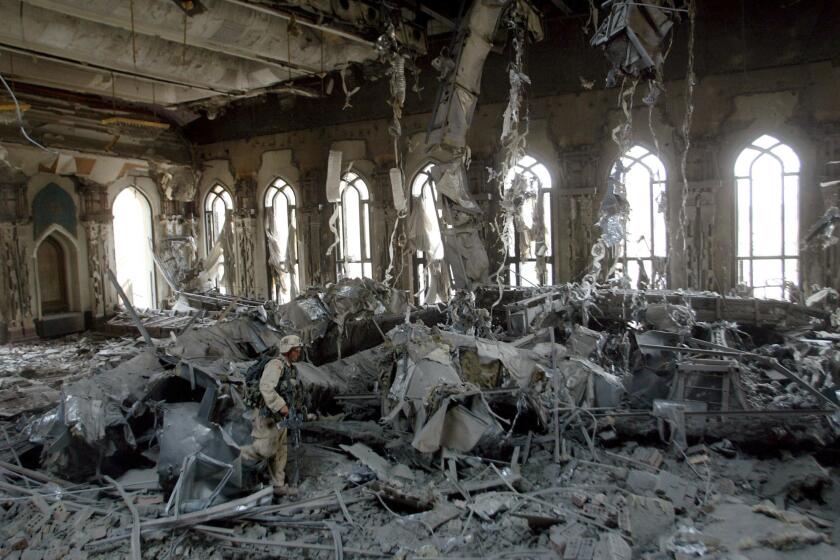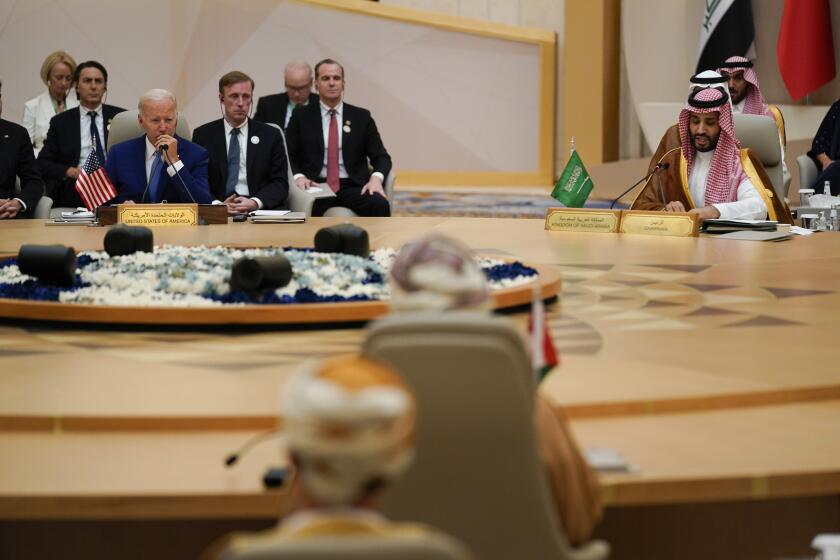Iraqi cleric’s loyalists heed his call to abandon protests after clashes kill 30
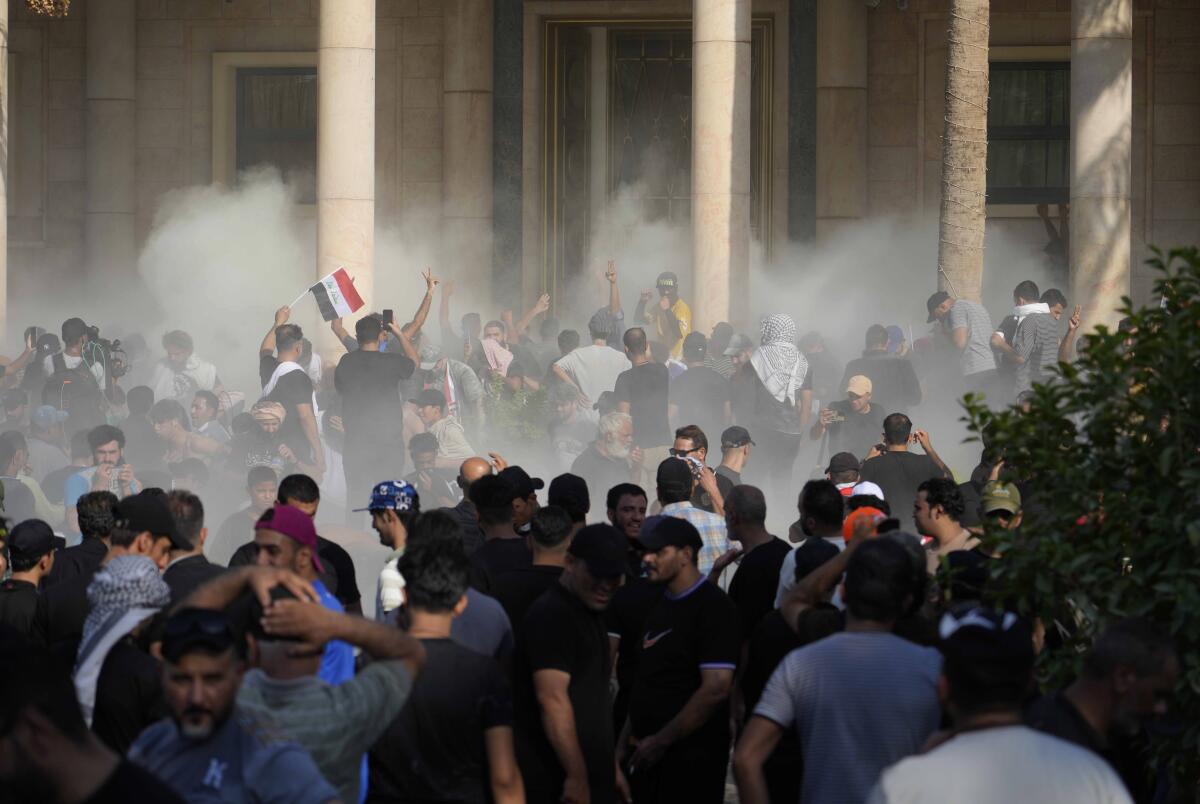
- Share via
BAGHDAD — After deadly clashes with security forces, armed supporters of a powerful Shiite cleric began to withdraw from the streets of the Iraqi capital Tuesday, restoring a measure of calm after a serious escalation of the nation’s political crisis.
Following two days of deadly unrest that sparked fears of instability spreading throughout Iraq and even the region, cleric Muqtada Sadr told his supporters to leave the government quarter where they had rallied. Within minutes, some could be seen heeding the call, dismantling their tents and walking out of the area known as the Green Zone.
The cleric’s supporters packed up their belongings, and trucks ferried away bundled-up mattresses. Mounds of trash littered thoroughfares and the steps leading up to Iraq’s parliament building. A portrait of a waving Sadr was placed against a tree as his followers rolled up carpets, tea glasses and the remnants of their four-week sit-in.
Iraq’s military also announced the lifting of a nationwide curfew, further raising hopes that the immediate crisis was ebbing, though larger political problems remain. Sadr’s move to de-escalate tensions raised questions of how issues such as the dissolution of parliament and the holding of early elections will be handled between rival groups.
Protesters supporting Sadr’s rivals also withdrew from their demonstration outside the government zone.
Iraq’s government has been deadlocked since Sadr’s party won the largest share of seats in October parliamentary elections but not enough to secure a majority government. That led to months of political infighting between Sadr’s Shiite followers and his Iran-backed Shiite rivals before it turned violent Monday.
The chaos began when Sadr announced that he would resign from politics and his supporters stormed the Green Zone, once the stronghold of the U.S. military and now home to Iraqi government offices and foreign embassies. They eventually breached the gates of the government palace, rushing into its lavish salons and marbled halls.
A day later, on Tuesday, Sadr’s supporters could be seen on live television firing both heavy machine guns and rocket-propelled grenades into the heavily fortified Green Zone, while security forces sporadically returned fire and armored tanks lined up. Some bystanders filmed the gunfight with their mobile phones, though most hid behind walls, wincing when rounds cracked nearby.
For much of the world, Iraq is a distant tragedy. But for its children raised amid chaos and war, that legacy has defined their generation.
At least 30 people were killed, officials said, before Sadr urged those loyal to him to go home, following pleas for restraint from several Iraqi officials and the United Nations.
“This is not a revolution,” Sadr said in a televised address.
Sadr, who spurred his followers to storm the parliament in July with calls for revolution and reform, apologized to the Iraqi people and said he could not support the violence. Many of his followers quickly heeded his call, dismantling their tents and leaving the Green Zone.
The immediate shift on the streets underscored his enduring control over his loyalists and, by extension, his influence over the Iraqi political class.
Ancient humans are believed to have first begun land cultivation in Iraq. Their modern-day counterparts are giving it up.
In addition to the dozens killed, more than 400 people were wounded, two Iraqi medical officials said Tuesday. The officials spoke on condition of anonymity because they weren’t authorized to release the information to journalists.
In a sign of the fear that the unrest would spread, Iran closed its borders to Iraq earlier Tuesday, though even before al-Sadr’s order, streets beyond Baghdad’s government quarter largely remained calm. Iraq’s vital oil continued to flow.
Members of Iraq’s majority Shiite Muslim population were oppressed when Saddam Hussein ruled the country for decades. The 2003 U.S.-led invasion that toppled Hussein, a Sunni, reversed the political order. Just under two-thirds of Iraq is Shiite and one-third is Sunni.
Now, the Shiites are fighting among themselves after the Americans largely withdrew from the nation, with Iranian-backed Shiites and Iraqi-nationalist Shiites jockeying for power, influence and state resources.
News Alerts
Get breaking news, investigations, analysis and more signature journalism from the Los Angeles Times in your inbox.
You may occasionally receive promotional content from the Los Angeles Times.
It’s an explosive rivalry in a country where many remain wary of the Iranian government’s influence even though trade and ties remain strong between its peoples. Iraq and Iran fought a bloody war in the 1980s that saw 1 million people killed.
Sadr’s nationalist rhetoric and reform agenda resonates powerfully with his supporters, who largely hail from Iraq’s poorest sectors of society and were historically shut out of the political system under Hussein.
Sadr’s initial announcement that he would leave politics implicitly gave his supporters the freedom to act as they saw fit. His televised speech Tuesday reined them back in.
Before that, the unrest led neighboring countries to issue warnings to their citizens, and one foreign embassy in Baghdad closed.
Not long after 9/11, the Bush administration shifted its attention to Iraq, saying it was part of an ‘axis of evil’ that pursued anti-American policies.
In addition to closing its borders, Iran urged its citizens to avoid any travel to the neighboring country, citing the unrest. The decision came as millions were preparing to visit Iraq for an annual pilgrimage to Shiite sites.
Later on Tuesday, Iranian state TV reported that flights to Iraq that were stopped had resumed.
Kuwait, which shares a 158-mile-long border with Iraq, called on its citizens to leave Iraq. The state-run KUNA news agency encouraged those hoping to travel to Iraq to delay their plans.
The U.S. Embassy in Baghdad put out a security alert for U.S. citizens, urging them to avoid the Green Zone and other protest areas, and also issued a “Do not travel” advisory.
President Biden wraps up his first Middle East trip with warnings on Russia, Iran, but no apologies for meeting with autocrats.
The Netherlands evacuated its embassy in the Green Zone, Foreign Affairs Minister Wopke Hoekstra tweeted early Tuesday.
“There are firefights around the embassy in Baghdad. Our staff are now working at the German embassy elsewhere in the city,” Hoekstra wrote.
Dubai’s long-haul air carrier Emirates stopped flights to Baghdad on Tuesday over the ongoing unrest. The carrier said that it was “monitoring the situation closely.” It did not say when flights would resume.
More to Read
Sign up for Essential California
The most important California stories and recommendations in your inbox every morning.
You may occasionally receive promotional content from the Los Angeles Times.
